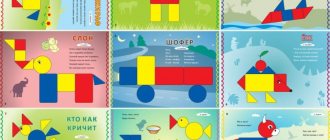Development of cognitive processes of a preschooler through play activities.
Lecture for parents
“Development of cognitive processes of a preschooler
through play activities."
“Children’s play often has deep meaning”
Schiller.
Preschool age
– the initial stage of personality formation. Education has a great influence on mental development. By the beginning of preschool age, mental development reaches a level at which it is possible to form motor, speech, sensory and a number of intellectual skills, and it becomes possible to introduce elements of educational activities. Under the influence of training and education, intensive development of all cognitive processes occurs.
One of the important tasks of modern preschool education is the creation of conditions that would contribute to the development of the child and the disclosure of his creative potential.
It's no secret that in preschool children, the development of cognitive processes, such as memory, attention, thinking, speech, is important. Cognitive processes are an integral part of any human activity that provide one or another of its information. They allow a person to outline in advance the goals, plans and content of the upcoming activity, to play out in his mind the course of this activity, his actions and behavior, to anticipate the results of his actions and to manage them as they are performed.
Preschool children need not to be taught, but to be developed. Development is at the forefront. They need to develop through activities accessible to their age - games.
There is nothing more harmonious than a child playing. The power of this harmony is so great that adults watching a child’s play involuntarily smile, experiencing joy and delight. The whole life of a preschool child is permeated with play; this is the only way he is ready to open himself to the world and the world for himself.
A game
- the first activity, which plays a large role in the formation of personality. Play is the leading activity of a preschooler, so it is easier to develop cognitive processes through play. When playing, children concentrate and remember better than when given direct instructions from an adult. In games, children reflect their accumulated experience, deepen and consolidate their understanding of the events depicted, of life. A child, like an adult, learns about the world through activity. Playing games enrich participants with new sensations, ideas and concepts. Games expand the range of ideas, develop observation, intelligence, the ability to analyze, compare and generalize what is seen, on the basis of which to draw conclusions from observed phenomena in the environment.
Play is an indispensable means of replenishing a child’s knowledge and ideas about the world around him, developing thinking, and valuable moral, volitional and physical qualities. In the formation of a child’s diversified personality, games are given the most important place.
To carry out full-fledged education and upbringing of preschoolers, it is necessary to develop cognitive processes - intuition, abstraction, thinking, the ability to solve cognitive problems, and the accumulation of sensory experience.
The main method of development of a preschooler is problem-based - search, and the main form of its organization is play.
Educational games provide an opportunity to develop processes such as attention and memory in preschoolers. Game tasks have a positive effect on the development of ingenuity, resourcefulness, and intelligence. Many games require not only mental, but also volitional efforts: organization, endurance, and the ability to follow the rules of the game.
The game has a great impact on the formation of personality; it is such a conscious activity in which the ability to analyze, compare, generalize and draw conclusions is manifested and developed. Playing games helps children develop their abilities to act, which are important in everyday practical activities.
The development of cognitive or intellectual abilities is influenced by perception, memory and attention. The development of cognitive processes in children is necessary for their preparation for school and further successful learning and intellectual development. But this should be a joint concern of educators and parents.
.
In preschool age, cognitive development is achieved through play, and didactic games
. Didactic games serve as educational tools - children master the characteristics of objects, learn to classify, generalize, and compare. A didactic game makes it possible to solve pedagogical problems in a playful way that is most accessible to preschoolers. The value of didactic games lies in the fact that they are created for educational purposes. Through their use, stronger and more conscious knowledge, skills and abilities can be added. The didactic game awakens children's imagination and creates high spirits. A child, captivated by the game, does not notice that he is learning, although every now and then he is faced with tasks that require mental activity from him.
Didactic games activate cognitive processes, develop cognitive interest, form a desire to learn new things, cultivate strong-willed qualities, and promote the formation of coherent speech.
Most developmental exercises are aimed at simultaneously improving several cognitive processes.
To develop attention
The exercise “Listen and clap” is used. Children are asked to clap their hands when the name of the fruit is heard. For example: wheel, apple (cotton), car, book, pear (cotton), banana (cotton), etc.
Development of thinking
exercises aimed at generalization, highlighting features, and grouping are facilitated. The game “Find the Extra One” asks the preschooler to combine objects based on a common characteristic and point to the extra one. For example, in the series “dog, chicken, cow, cat” the chicken will be superfluous, since it is a bird among animals. The game is adjusted for early preschool age with easier subjects.
For speech development
For children, retelling tasks are suitable, in which the child improves phonemic awareness and pronunciation. To jointly develop speech and imagination, children are asked to come up with their own story.
Development of auditory memory
facilitate exercises that require you to remember words or pairs of words and reproduce them. Visual memory and attention are most easily formed in tasks like: “Here are the objects. Look carefully. Try to remember the location and features. Close your eyes while I rearrange them. Now put the items in the original order.”
Children's imagination
develops in almost any activity: drawing, playing, playing with plasticine. Inviting a preschooler to come up with an image or heroes of the game creates the arbitrariness of the imagination.
Development of visual perception
occurs in the process of the preschooler establishing the shape, color, and size of objects. An excellent option would be exercises with mosaics, puzzles, construction sets, and pyramids. For auditory perception, tasks with sound accompaniment are selected. For example, children need to determine who makes a particular sound.
Role-playing game
is of decisive importance for the development of imagination. Gaming activity influences the formation of arbitrariness of mental processes. Through play, children begin to develop voluntary attention and voluntary memory. When playing, children concentrate better and remember more. The conscious goal (to focus attention, remember and recall) is highlighted for the child earlier and is easiest in the game. The very conditions of the game require the child to concentrate on the objects included in the game situation, on the content of the actions being played out and the plot. The need for communication and emotional encouragement forces the child to focus and remember.
In order for the development of cognitive abilities of preschoolers to be effective, it is necessary not only to correctly select the games and activities necessary for this, but also to interest the child in one activity or another. Only in this case will the development of your preschooler’s cognitive abilities proceed at a rapid pace, and the child’s interest in the world around him will never fade!
Development of cognitive activity in children through play
Author: Loginova Irina Vladimirovna
“Development of cognitive activity in preschool children”
Topic: “Development of cognitive activity in preschoolers through play”
In preschool age, play is the leading activity. In this regard, the goal of my teaching activity is to increase the level of development of cognitive activity through games and gaming exercises. The tasks that I identified to achieve this goal:
-improve the perception of color, shape, size, space and time;
-train visual and auditory. Motor-motor memory;
-develop concentration, switching and distribution of attention;
-learn to master basic skills of analysis and synthesis, establish identities and differences, generalize, classify, draw conclusions;
- develop creative imagination;
- stimulate speech development by training the movements of the fingers, develop graphic skills;
-develop communication skills and abilities.
In my practical activities I use the method of interactive play, which helps create conditions for children to gain meaningful experience in social behavior. In such games, children not only learn new things, but also learn to understand themselves and others, and gain their own experience. During such games, I introduce children to a problematic situation that needs to be solved independently. To achieve this goal, children interact with each other, thus using socio-game techniques (work in pairs, in subgroups). In this case, an interactive game acts as a tool that allows you to significantly diversify the form of knowledge of the surrounding reality. To effectively implement logical tasks and develop attention in children, I use constructive games: “Mongolian Game”, “Columbus Egg”, “Pythagoras”, “Magic Circle”, “Tangram”, as well as intellectual games developed by B.P. Nikitin (for example, “Fold the Square”, “Guess”) These games contribute to the development of the ability to compare, draw independent conclusions, develop logical and imaginative thinking, and creative imagination. In the intellectual development of a child, in enriching his creative abilities, symbolic analogies play an important role, with the help of which the child gradually masters the ability to construct visual and spatial models. In play, the child discovers the symbolic meaning of a substitute object, and in drawing, the symbolic meaning of graphic constructions. The use of symbolism speeds up the memorization process. I offer children tasks in a playful way: “What does a circle look like?” They need to make “magical transformations”, complete drawing objects from different geometric shapes. Then I suggest the children play with the line in the same way. I use game tasks: using symbols to draw the objects I named. And then the children, looking at the symbols, remember the named words. This helps children develop memory, imagination, and attention. Children with general somatic weakness and delayed development of locomotor functions are also characterized by some delays in the motor sphere. Motor impairment is expressed in the form of poor coordination of complex movements, a decrease in the speed and dexterity of their execution. Therefore, I offer children game tasks: to build various objects from counting sticks to develop children’s perception and sensation, voluntary attention and memory, I use games with buttons: “Fishing”, “Aquarium”, “Button Necklace”, “Button Lotto”, “Button Massage” “Thanks to this, sensorimotor development occurs, which is a condition for successful interaction with the outside world. To instill interest in activities in children, I use finger games in my work. For the development of fine motor skills, I offer tasks using colored paper clips and hair clips, various magnets with which children perform play exercises: “Make beads as a gift for mom”, “Weave a wreath”, “Decorate the meadow”, Plant a butterfly on a flower”, which helps develop children's imagination, logical thinking, memory and speech.
I actively use finger games with a pencil such as “Self-massage”, “Spring”, “Going down the stairs”, which help relieve fatigue, muscle tension and have a tonic effect on the biological activity of blood circulation in muscles and bone joints. Holding a pencil while performing exercises promotes the development of volition (awareness) and increases coordination of movements. To develop perceptual processes in preschoolers, I use low-mobility games: “Recognize the figure”, “Colored balls”, “Find your color”, “Catch the ball”. These games contribute to the development of concentration, emotional and volitional qualities. I systematically conduct kinesiological exercises with children, which are aimed at developing both hemispheres of the brain: “Rings”, “Fist-rib-palm”, “Draw a house with both hands at the same time”
When working with children I use “Logical Baby” games, I have developed game tasks followed by self-tests “Put things in order”, “Odd Four”, “Find objects on the shelf”. These games develop children’s analytical skills (by comparing the correct answer with the result of their decision ), the skill of self-control of the results of one’s own activities.
To develop in children certain skills and abilities of educational activities. I use mnemonic techniques that promote the development of visual and auditory memory, associative thinking (learning poems, riddles). To develop cognitive activity, I widely use verbal games. In games like this. Like “Recognizing an object by given characteristics”, “It happens and it doesn’t happen”, “Pairs of words”, children develop the ability to identify the logical connection between objects. I also use information and communication technologies (ICT): games from the series “Learning to think”, “Learning to remember”, “Learning to analyze” comments powered by HyperComments




